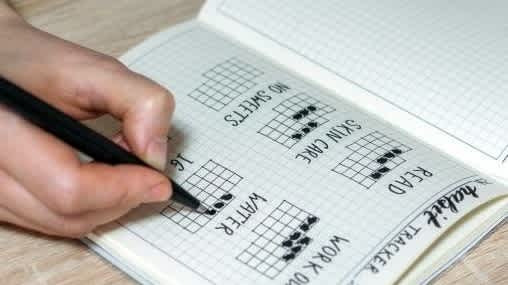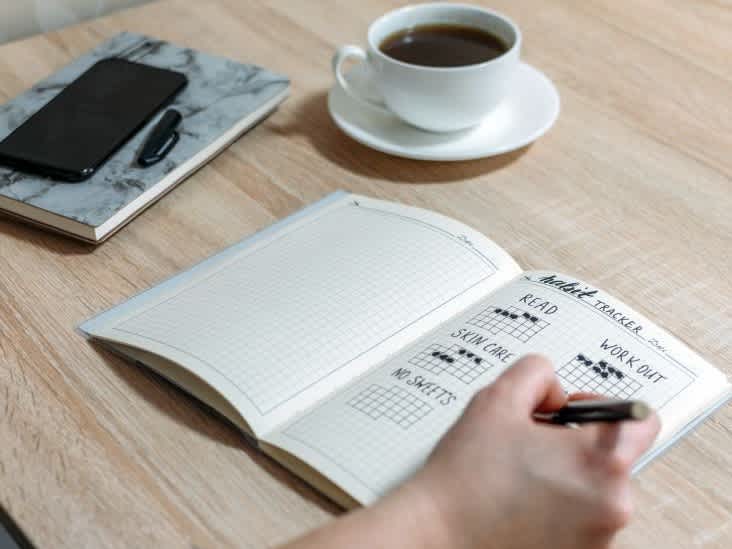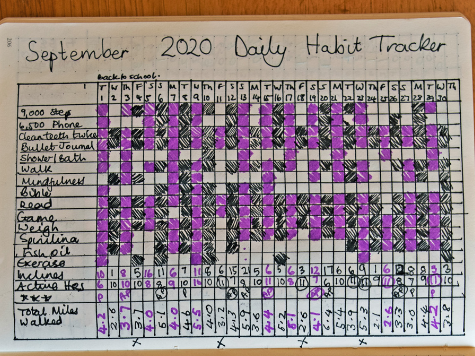
How To Use a Habit Tracker To Level Up Your Life
May 5, 2023
By Will Moore
The number #1 reason people fail to build up a habit is the lack of evidence that they're making progress.
Think about it: if you don't have concrete proof that you're getting closer to your goal—or if you don't even know what your goal is—how can you know if your efforts are paying off?
When you're trying to do anything new and stick with it, it can be easy to lose track of how much you've improved or failed to improve.
You might not notice the small steps moving forward because they're just part of your daily routine now — but if you're trying to change your life by building up a new habit, recognizing those steps is crucial!
But what if there was a way for you to see how much closer you are getting to your goal? What if there was a way for you to feel accomplished every time you did something right?
There is! It's called a habit tracker. A good habit tracker will help you see where you've been and where you're going so that you can keep pushing forward and stay motivated in your pursuit of change.
What are habit trackers?
When you're trying to build a new habit, it can be hard to keep track of how often you're doing it. That's where habit trackers come in.
Habit trackers are a great way to keep track of your daily habits — and habit tracking can be applied to any goal, whether it's exercise, reading, or eating healthy foods.

The habit journal or tracker is basically a simple tool to track your habits and helps you visualize your progress towards your goals.
You can use a physical notebook, an app, or even write things down on a piece of paper to track your habits. The important thing is that you get into the habit of tracking your daily habits and make sure you do it consistently!
In simple words, habit trackers provide a visual reminder of the progress made, which helps individuals to stay motivated and on track towards achieving their goals.
Let's talk more about how to use a habit tracker and importance of habit tracking apps.
There are a lot of advantages to using a habit tracker. Here are 5 of the biggest:
5 Powerful Benefits of Using Habit Tracking Apps
1. A habit tracker keeps you motivated
Tracking your habits gives you a visual reminder that you're making progress towards your overall goals.
Every time you see that you've successfully completed a habit you'll feel an urge to keep going. If you know that at 6:00 pm every Sunday evening, you're going for a run around your neighborhood, you might want to skip out on your workout just because you're tired or busy with other things.
However, when you have a habit tracking app, you'll have a reminder of all the other times you've been for a run and how it's stacking up to make you fitter, healthier and happier in the long run.
2. A habit tracking app serves as a constant reminder
The research is pretty clear, people who track their progress towards their goals are much more likely to reach them. One of the main reasons for this is having a constant reminder – or prompt – to take action.
When you look at your habit tracker every day, week, or month (depending on the habit that you're tracking) you'll be reminded of the action you need to take and much less likely to forget or procrastinate.
The other thing here is that you are naturally dishonest! Seriously, we all have a tendency to lie to ourselves and others to keep us in our comfort zones.
I recommend you to read: How to Find your values
Even now you're probably thinking "I don't lie, I'm as honest as they come", but even that is a lie you’ve made up because the truth conflicts with your worldview and values that “it's not OK to lie”.
The point I'm making here is that when you have visual evidence – before your eyes – of whether you're on track with your habits or not, you'll be much more honest with yourself about your actual progress.
3. A habit tracker helps you to focus
When I ask people why they feel they haven't met their goals, one of the most common answers is "I haven't done enough". But they've got it backwards – in reality, the reason they're not where they want to be is that they're doing too much.
Let me explain.
If you're anything like me, you have a constantly expanding list of things to do. Sometimes that list can feel intimidating – which can lead to procrastination, getting distracted with other things and losing focus of your main objectives and the core tasks you need to accomplish to reach them.
A well-planned habit tracker serves as a reminder of those big goals and the smaller actions you need to take to help you get there.
The key is to keep it simple and not spread your focus over too many new habits. Your main goal should be to develop new habits and break your bad habits.
4. Increased self-awareness
Habit tracking can help you become more aware of your behaviors and patterns, which can be useful for making positive changes in your life. For example, if you are trying to get back on track with diet a habit tracker can help you to track your eating habits.
5. A habit tracker makes you feel good
Gratification is the name of the game here. It's that satisfying feeling when you cross something off your to-do list.
Confession: I sometimes add things I've already done to my to-do list just so I can cross them off!
It might seem trivial to you but that simple act of adding a check to a box triggers a flood of happy chemicals in your brain, most notably, dopamine.
Whenever you recognize a task as completed, your brain releases a little shot of this neurotransmitter. And that generates those feelings of accomplishment, satisfaction, and happiness.
The really cool thing is this release of dopamine not only gives you that good feeling but also motivates you to keep on completing tasks and extend that pleasant feeling.
Habit Tracking apps by their very nature encourages you to check things off a list of daily, weekly, or monthly goals – giving you that neurotransmitter shot – and encouraging you to keep doing more of the things that level up your life.
So, now I guess it's a good time to take a look at how to use a habit tracker most effectively.
How To Use a Habit Tracker Effectively?
We have discussed how habit tracker app can help to develop good habits and get rid of your bad habits. Now let's talk about how to use a habit tracker effectively.
1. Set your outcomes
The very first step in using a habit tracker to the best effect is deciding what habits you want to track. And the specific habits that you track really depend on your overall goals. It's important to note here that this could relate to building a new Healthy habit or your understanding of 7 steps of goal setting.
Let's use a common example and say that you want to get in shape. The very first thing is to decide on what "in shape" really means to you. Does it relate to having a certain weight? Or a certain athletic ability like being able to run a marathon or easily bench press your own bodyweight? Or you want to focus on your overall physical health.

When you've clearly identified that goal, then it's time to look at your existing habits to track them.
What are you doing right now that's getting in the way of reaching that goal? Maybe you have a bad habit of eating potato chips – if that's the case you could add "didn't eat chips" to your daily habit tracker.
Then, decide on the habits you want to build that will propel you toward that goal. Maybe you want to add "run at least 3 miles" to your habit tracker.
In the end, you can use a simple habit tracker, to build or replace habits that push you towards a goal in any of the 5 Cores of your life that will contribute to your overall happiness and fulfillment.
From reading more and educating yourself, better eating- and sleep habits, better control over your finances, and more intimate relationships with others or with yourself – the possibilities for self growth journey are practically endless.
2. Pick your tools
In the past few years, I've tried a lot of different apps on my habit tracking journey. One of my favorites is a simplified version of a bullet journal first created by Rhyder Carroll.
I've found it to be one of the easiest and most effective tools for tracking habits. It has actually helped me a lot in personal development and developing new habits.
It's a simple grid (like a calendar) with the days of the month across the top and the habits you want to track down the side.
Every time you complete your habit, put a check, cross or some other symbol in the box for the corresponding day.
Over time, you'll see those boxes filling up and get a clear visual representation of your progress.
The important thing here is to not spend eternity designing the perfect habit tracker app. So, put away the glitter glue and colored pens and make something quick and simple that doesn't take time away from what you're actually trying to do here – create better habits! You can get sneak peak of our upcoming weekly habit tacker that will be more effective because it incorporates technology, fun, and play to reduce the friction of tracking.
In fact, there are plenty of free habit trackers you can download from the internet or habit-tracker notebooks you can buy on Amazon or any bookstore.

Another form of this visualization is a Habit Tracker Wheel. It's basically the same principle but in a circle type. On the one hand it does look nicer but it's much more challenging to create by hand.
I'm not aware of any psychological benefit of creating your habit tracker in a circular form, so I'd just stick with the simple calendar style.
Why? Because the more complicated things get, the more likely you are to give up.
As someone who has tried a number of different habit tracker apps, I can tell you that the most successful one for me was also the simplest.
Of course, there are also a lot of habit tracker apps that are specifically designed for tracking habits. Whether you're an Apple or Android user (no judgment), there's plenty to choose from so I won't go into detail about individual apps.
In fact, if you are an Apple user then you should definitely try out the apple watch. It is in fact one of the best habit trackers app and can help you with habit tracking.
That being said, I think it would be useful for you to know what to look out for when you're choosing a habit tracker app.
Really you want to go for simplicity, the app should have a clear interface, the possibility to add daily, weekly and monthly goals, and a clear visualization so that you can actually see your progress every day.
The simpler it is, the more likely you'll use it regularly — even if there are other apps with more bells and whistles!
Another great feature could be reminders, especially if you plan on performing your habits at the same time of day (which I recommend for building a strong habit routine).
If the habit tracker or health app has a way to gamify your habit-building by adding a competitive element or making tracking habits fun and addictive – you're on to a winner!
Gamification is an incredibly powerful way to build habits, so I'm going to talk more about that later.
3. Create a system that works for you
One of the most important things to do here is to make sure that you make habit tracking... a habit!
Like all habits, it's easy to forget about them and fall back into old patterns – especially in the beginning. Here are some tips to stop you from falling off the wagon:
Put your habit tracker somewhere you can see it
If it's a physical notebook, put it in a prominent place where you know you're going to see it. If it's an app, add a shortcut on your phone's home screen.
Keep your habit tracker simple
If it looks complicated or confusing, it probably isn't going to get used very much. Aim for something that's easy to use and simple to understand.
Make filling out your habit tracker a routine
One of the absolute best ways to create a new habit is to connect it to a cue or prompt. If you have an evening routine, I'd recommend adding your habit tracker to it.
It could be something you do right after you brush your teeth or with a calming cup of tea or just before you pick up your book for your nightly read.
This technique is called habit stacking – leveraging an existing habit that you already have to create a new one. I wrote in detail about habit stacking here.
Don't beat yourself up if you fail
Last of all, I think it's very important to mention that building habits doesn't happen overnight. It takes time and patience. May be you can seek from a life coach for young adults to help you with habit formation.
So, when you miss a day (or even a week) don't give up on yourself and resort back to your old ways. Make sure you get back up on the horse and keep on fighting to become the healthiest, happiest, and best version of yourself.
How Long Do I Need to Track My Habits?
There is no one answer to how long it takes to form a new habit. Some people can form a habit in just a few days, while others find it takes months.
The exact amount of time needed to form a habit varies widely depending on who you ask. Some experts say 21 days (as in the book, The Power of Habit), while others say it takes 66 days or more.

The truth is: there is no magic formula for how fast new habits are formed. The answer depends on many factors, including:
How complex the habit is —
Complexity is not just about difficulty; it's also about whether there are multiple steps involved, or if it requires multiple cues and rewards.
For example, brushing your teeth might be a single step, but scheduling a dentist appointment requires multiple steps and may require an app reminder or note on your calendar.
Your previous experience —
If you've never done something before, it may take longer for your brain to learn how to do it than someone who has done it before.
It's like learning a new language: If someone learned French for five years in school, they're likely going to pick it up faster when they take a course in their 30s than someone who just started learning yesterday.
The good news is that you'll know when it's time because tracking feels effortless and natural — no matter what habit you're tracking or how often you're doing it.
How to make habits stick by 'gamifying' habit tracking
As I mentioned earlier, apps that gamify habit creation are an incredibly powerful tool, and there's a very good reason.
You are familiar with how to use habit tracker and importance of habit tracking. However, it mostly depends on your will and dedication to make good habits stick.
Gamifying habits removes the mental resistance from seeing things as a chore – and makes you actually WANT to take the small actions that build up to making you healthier and happier in all areas of life.
But what is gamification and how to use a habit tracker for it?
Gamification is the process of using game mechanics (points, badges, leaderboards) to motivate us to achieve goals.
Gamification has been used for years as a tool for social change (check out Jane McGonigal's TED Talk for more on this), but now it's becoming an increasingly popular technique for changing our own behavior — from exercise to sleep schedules to dieting.
It may sound like hocus-pocus at first glance, but when you think about it, we're already doing this all the time — with the apps on our phones and laptops. Why not make them work for us instead?
That's exactly what I've done with my app. A simple, fun way to build success habits in all 5 Cores and level up your life. Check out my momentum habit tracker app.
Conclusion - How to Use a Habit Tracker
To build a habit successfully, one needs to have concrete evidence of making progress. Keeping track of daily habits can be challenging and easily forgotten, hence the importance of a habit trackers.
A habit tracker, whether in a physical notebook, clear habit journal, an app, or a piece of paper, helps one to visualize progress towards their goals.
Habit trackers have several benefits, including keeping one motivated, serving as a constant reminder, helping one to focus, and making one feel good.
Using a habit tracker app is crucial as it provides the many benefits, which are essential in habit formation.
